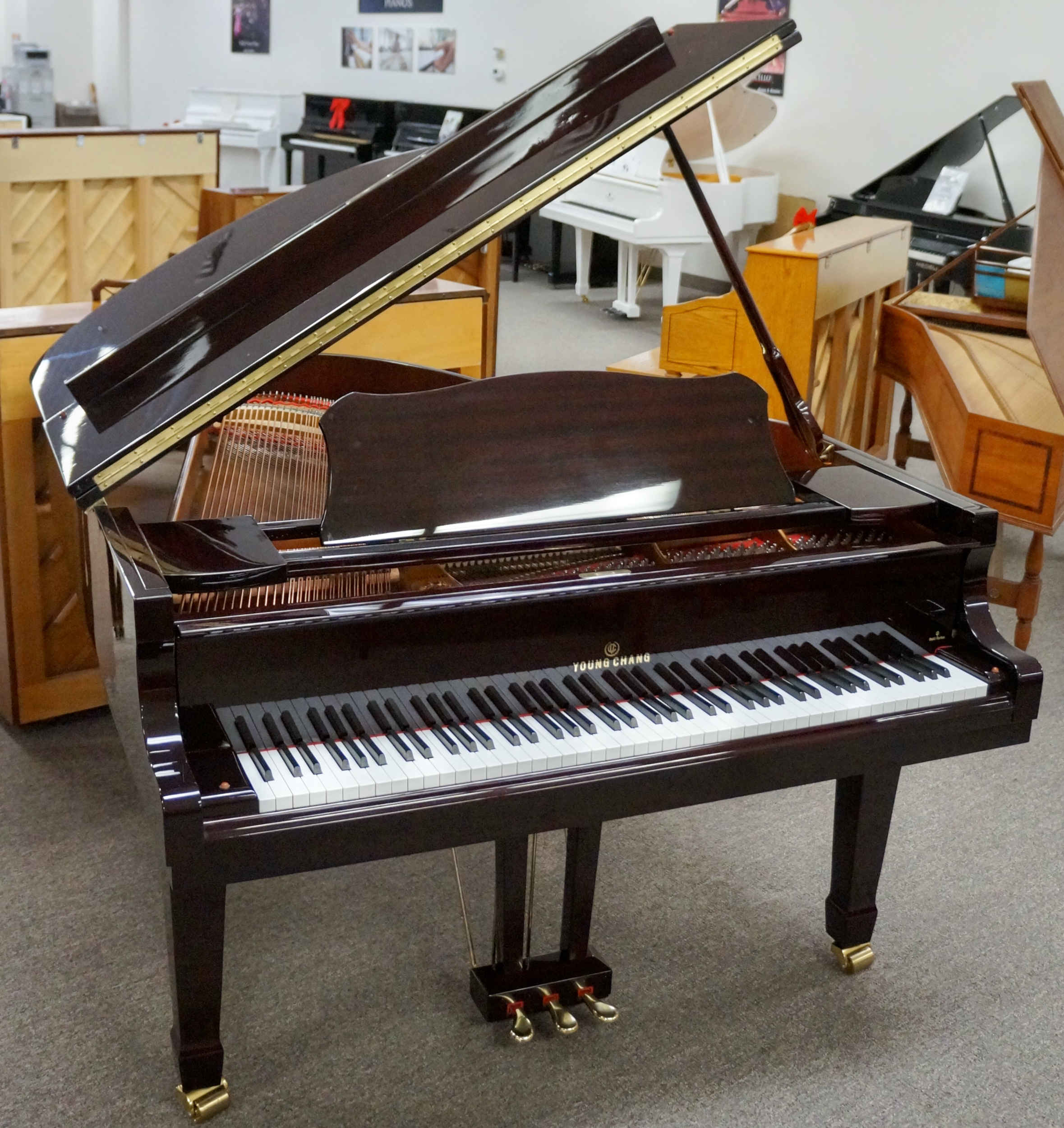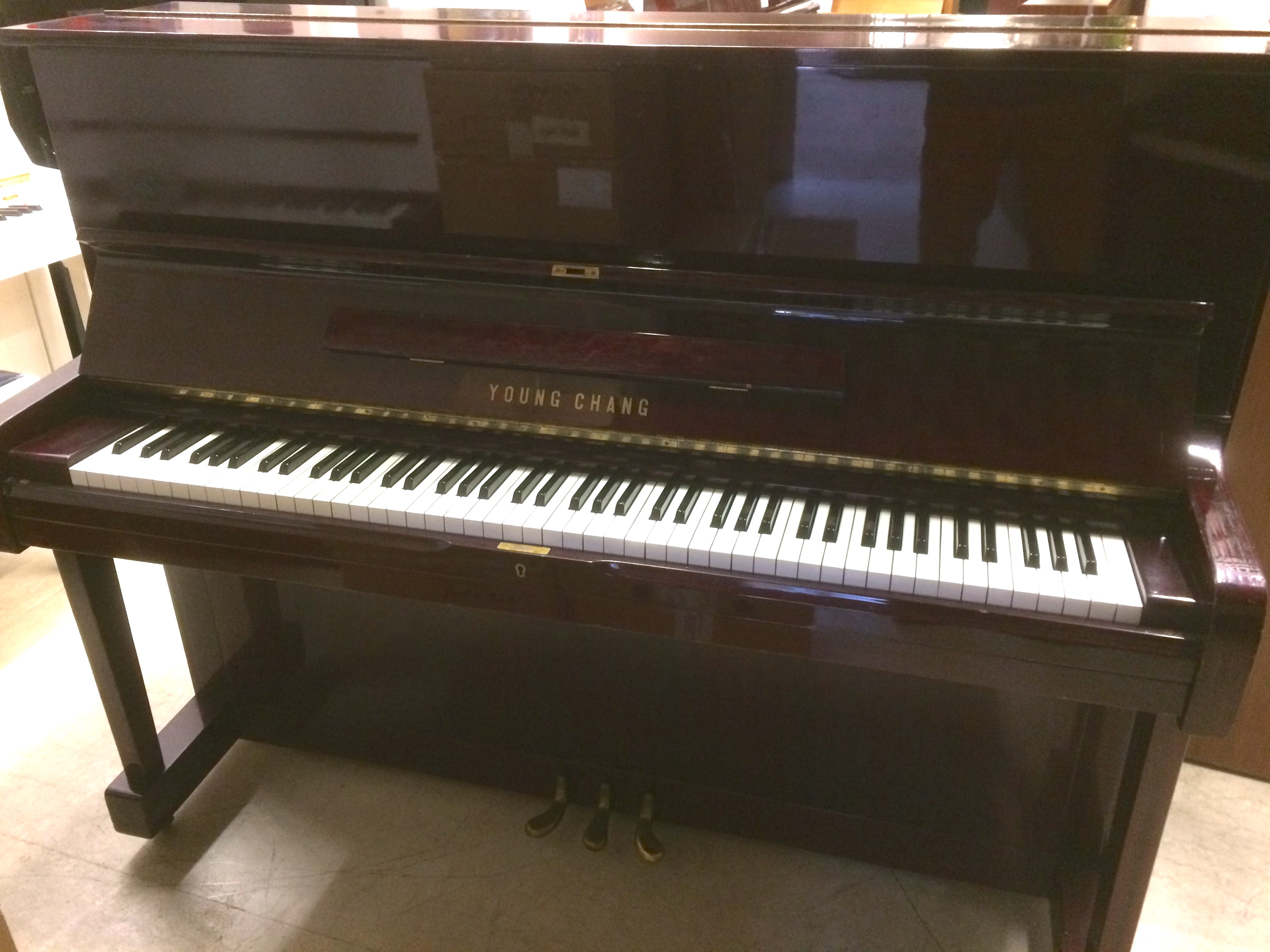The History of Young Chang
- Young Chang Piano Model U107
- Young Chang Piano History
- See Full List On Pianomart.com
- String Instruments
In 1956, three brothers — Jai-Young, Jai-Chang, and Jai-Sup Kim — founded Young Chang and began selling Yamaha pianos in Korea under an agreement with that Japanese firm. Korea was recovering from a devastating war, and only the wealthy could afford pianos. But the prospects were bright for economic development, and as a symbol of cultural refinement the piano was much coveted. In 1962 the brothers incorporated as Young Chang Akki Co., Ltd.
In 1964 Yamaha and Young Chang entered into an agreement in which Yamaha helped Young Chang set up a full-fledged manufacturing operation. Yamaha shipped partially completed pianos from Japan to the Young Chang factory in Incheon, South Korea, where Young Chang would perform final assembly work such as cabinet assembly, stringing, and action installation. This arrangement reduced high import duties. As time went by, Young Chang built more of the components, to the point where they were making virtually the entire piano. In 1975 the arrangement ended when Young Chang decided to expand domestically and internationally under its own brand name, thus becoming a competitor. Young Chang began exporting to the U.S. in the late 1970s, and established a North American distribution office in California in 1984. In addition to making pianos under its own name, Young Chang also made pianos for a time for Baldwin under the Wurlitzer name, for Samsung under the Weber name, and private-label names for large dealer chains and distributors worldwide.
1988 YOUNG CHANG BABY GRAND PIANO IVORY POLISH. 1988 YOUNG CHANG BABY GRAND PIANO IVORY POLISH FINISH MODEL G150 (5' 0' REGULAR RETAIL PRICE $7.999.00 CURRENT PRICE AT THE SHOWROOM $5.542.00 EBAY ONLINE SPECIAL $4.895.00 This is a pre-owned 1988 YOUNG CHANG baby grand piano in beautiful ivory polish finish. Producing high-quality pianos, Young Chang was founded as a distributor of Yamaha pianos. These professionally made pianos are for suitable for those just beginning as well as the intermediate pianist. Types of Young Chang pianos Most pianos will be either upright or various sizes of a grand piano. The piano is a simple instrument constructed from basic materials and the comparison from one piano to another piano easily captures the critical eyes and ears of the world where flaws cannot be hidden and true brilliance stands apart. Thus, to complete and transform wood and iron into an uncompromising musical instrument one needs resiliency.
Weber & Co. was established in 1852 by Albert Weber, a German immigrant, and was one of the most prominent and highly respected American piano brands of the late 19th and early 20th centuries. During the consolidation of the American piano industry in the early 20th century, Weber became part of the Aeolian family of brands. Following Aeolian's demise in 1985, Young Chang acquired the Weber name.
Young Chang Piano Model U107
In 1995, in response to rising Korean wages and to supply a growing Chinese domestic market, Young Chang built a 750,000-square-foot factory in Tianjin, China, and gradually began to move manufacturing operations there for some of its models. Today, the Tianjin facility produces Young Chang and Weber pianos, and components for the Albert Weber line, which is assembled in South Korea.
Hyundai Development Company, a Korean civil-engineering and construction firm, acquired Young Chang in 2006. The company says that Hyundai Development has brought the necessary capital for factory renovations and has instituted new advanced industrial quality-control systems.
Young Chang, Weber, Albert Weber Piano
In 2008 Young Chang hired noted American piano designer Delwin D. Fandrich to undertake a redesign of the entire Young Chang and Weber piano line. Highlights include extensively redesigned cast-iron plates, new string scales, and new rib designs. New directly-coupled bass bridges, along with unique 'floating soundboard' configurations, improve soundboard mobility around the bass bridge for better bass tonal response. At the same time, a revised hammer-making process, in which the hammers are cold-pressed with less felt compression, provides for greater hammer resilience and improved tone, with less voicing required. Fandrich says that all of these features and processes contribute to his goal of building instruments with improved tonal balance and musicality, and provide opportunities to standardize manufacturing processes for better quality control. The new designs were phased in gradually from 2011 to 2013.
Along with being redesigned by Delwin Fandrich, former multiple piano lines were consolidated into just three lines: the Young Chang (Y) and Weber (W) series are entry- and mid-level instruments made in China, and the Albert Weber (AW) line comprises upper-level models made in Korea. The AW grands have lower-tension scales, maple rims, and Renner actions, and higher-quality hammer felt, soundboard material, and veneers (on wood-veneered models). The Y and W grands have lauan rims and Young Chang actions. The AW verticals use slightly better materials than the other verticals for the cabinets, hardware, music wire, and keys, though in general the differences are smaller than with the grands.
Young Chang Piano History
The Young Chang and Weber pianos distinctly differ from one another: the Weber models have a low-tension scale and softer, cold-pressed hammers, and the greater warmth and romantic tonal characteristics that often accompany that type of scale; the Young Chang models have a higher-tension scale and firmer cold-pressed hammers, and the greater brightness and stronger projection of a more modern sound. The Weber line, also known as the Premium Edition, also has agraffes in the bass section of the verticals, and beveled lids on the grands.

Quality control in Young Chang's Korean factory has improved little by little over the years, and is now nearly as good as that in Japan. Most of the problems currently encountered are minor ones that can be cured by a good dealer make-ready and a little follow-up service, and the pianos hold up well in the field, even in institutions. The Albert Weber pianos, in particular, have great musical potential and respond well to expert voicing. Pianos from the factory in China, like other pianos from that country, have been uneven in quality, but in recent years have greatly improved. Young Chang says that Hyundai Development Group has upgraded the factories in both countries, and that the pianos made at the Tianjin factory are now on a par with those made in Korea.
Young Chang also owns Kurzweil Music Systems, a manufacturer of professional keyboards and home digital pianos, which it acquired in 1990.
개요
The Beautiful Sound That Never ChangesSee Full List On Pianomart.com
Young Chang Piano: Made in Korea and Beloved Around the World Tableedit for mac.
Dreaming of hope from the ashes of the Korean War, HDC Young Chang established Korea's first piano atelier in November 1956.
Taking full responsibility with the world's best manufacturing technology and an unwavering craftsmanship, the piano masters of HDC Young Chang have been exerting every effort to reach perfection in offering high-quality products.
Technological
Competencies

Quality control in Young Chang's Korean factory has improved little by little over the years, and is now nearly as good as that in Japan. Most of the problems currently encountered are minor ones that can be cured by a good dealer make-ready and a little follow-up service, and the pianos hold up well in the field, even in institutions. The Albert Weber pianos, in particular, have great musical potential and respond well to expert voicing. Pianos from the factory in China, like other pianos from that country, have been uneven in quality, but in recent years have greatly improved. Young Chang says that Hyundai Development Group has upgraded the factories in both countries, and that the pianos made at the Tianjin factory are now on a par with those made in Korea.
Young Chang also owns Kurzweil Music Systems, a manufacturer of professional keyboards and home digital pianos, which it acquired in 1990.
개요
The Beautiful Sound That Never ChangesSee Full List On Pianomart.com
Young Chang Piano: Made in Korea and Beloved Around the World Tableedit for mac.
Dreaming of hope from the ashes of the Korean War, HDC Young Chang established Korea's first piano atelier in November 1956.
Taking full responsibility with the world's best manufacturing technology and an unwavering craftsmanship, the piano masters of HDC Young Chang have been exerting every effort to reach perfection in offering high-quality products.
Technological
Competencies
Equipped with the world's best technology Recruited Joseph Pramberger, the former Vice President of Manufacturing at Steinway & Sons Scouted for the globally renowned piano master, Delwin D. Fandrich Became an OEM after exchanging grand and upright piano designs with Steinway & Sons for 11 years since 1999
Used an original design technology along with self-developed, cutting-edge parts
Its pianos' hammers are made of the highest-quality natural materials using the latest CP method
Exclusive EP action with high precision and strong durability
Self-developed, cutting-edge V frame used for high-end pianos worldwide
Young Chang's self-developed bronze wire and imported steel wire from Germany improve accuracy
Young Chang Piano provides the highest-quality products to customers with its highly advanced technology without being swayed by its competitors' aggressive and exaggerated marketing strategies, which cannot even develop the piano parts.
Major Accomplishments
String Instruments
Korea's first piano manufacturerKorea's first manufacturer to export pianos
Korea's first piano manufacturer to develop a concert grand piano
Korea's first piano manufacturer to obtain KS and JIS certifications
Korea's first manufacturer to obtain the ISO 9001 certification for all sectors of the manufacturing process
A three-time gold medalist in carpentry at the WorldSkills
An official piano supplier to globally well-known music landmarks including the St. Petersburg State Conservatory in Russia, the Vienna Boys' Choir in Austria, and the Lincoln Center for the Performing Arts in New York City, United States

